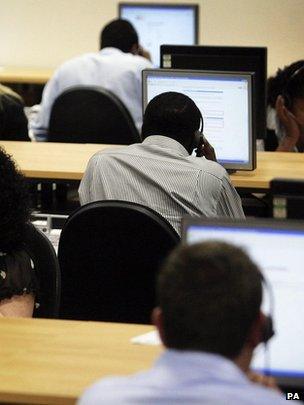Nuisance marketing calls: MPs urge watchdogs to do more
- Published

The MPs questioned the methods used to obtain consent for marketing calls
Regulators should do more to clamp down on companies that make nuisance calls, an influential group of MPs has said.
The Culture, Media and Sport committee said watchdogs should use their powers more often to punish misuse of phone networks and contact information.
The committee called on Ofcom and the Information Commissioner's Office to take increased action.
Committee chairman John Whittingdale said such phone calls were a "source of irritation and distress to millions".
Illegal use
A report from the committee rejected the idea of a single regulator to tackle the issue.
It suggested a better solution would be a single point of contact for consumers, combined with more co-operation between existing watchdog bodies.
The committee found that a significant cause of nuisance calls was the unfair or even illegal use of personal data.
This included obtaining a person's "consent" to receive unsolicited marketing calls in ways that were "at best opaque and at worst dishonest" and trading personal details with companies which were "lacking in scruples".
The MPs said the information commissioner "should use his existing powers to tackle them far more, and should not shy from imposing repeated penalties on companies that are repeat offenders".
'Needless interruption'
The committee recommended a single online form and helpline - clearly advertised on phone bills - for consumers to report cases.
Mr Whittingdale said: "At best, the underlying scatter-gun marketing approach causes needless interruption to many while providing occasional benefit to a few.
"At worst, these are unscrupulous and potentially fraudulent practices that can cause great annoyance, anxiety and loss.
"The challenge is one of curtailing that, while at the same time allowing legitimate marketing and unsolicited calls made for good reason."
Mr Whittingdale said there was scope for regulations preventing nuisance callers from using blocked or false numbers.
The threshold for enforcement action under EU regulations should also be lowered, he added.
- Published6 November 2013
- Published28 October 2013
- Published12 October 2013
- Published10 September 2013